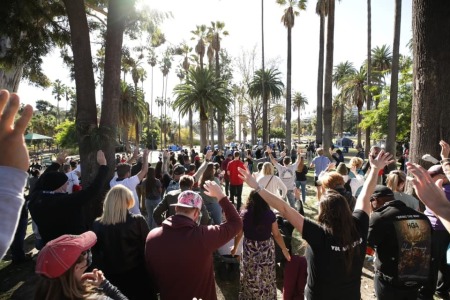Nearly 3-in-10 Americans say COVID-19 pandemic has strengthened their faith: Pew

More than one-quarter of Americans say that the COVID-19 pandemic has strengthened their faith, giving the United States the highest percentage among 14 developed countries analyzed for a new Pew Research Center report.
In a report published last week, Pew found that nearly three out of 10 Americans (28%) say that their faith has grown stronger during the pandemic, while nearly four out of 10 say the pandemic has helped strengthen their family bonds.
The Pew report drew from data collected via its Summer 2020 Global Attitudes Survey, which was built on interviews conducted among 480,000 individuals in 91 countries. The survey is based on national samples. The U.S. sample consists of a plus or minus 3.7-percentage-point error margin.
Spain had the second-highest percentage of respondents, saying that the pandemic had strengthened their faith at 16%
From there, it was Italy at 15% and Canada at 13%. Australia, France, South Korea and the United Kingdom in a four-way tie at 10%.
Additionally, 28% of American respondents also said they believed the pandemic had strengthened people's religious faith in their country, which was also the highest percentage among the surveyed developed countries.
At the bottom of the surveyed industrialized nations was Denmark. Just 2% of Danish respondents said their religious beliefs were strengthened during the pandemic.
In Italy, 19% of respondents said that they believed the pandemic had strengthened the religious faith of people in their country.
After Italy, Spain and Netherlands tied with 17% of respondents who said that the faith of the people in their country were strengthened.
At the bottom was Japan, in which only 5% of respondents felt that the people's religious faith in their countries had been strengthened. Additionally, only 5% of Japanese respondents said their own religious beliefs were strengthened during the pandemic.
“The United States recently has experienced some trends toward secularization, including a growing share of the population that does not identify with any religion and a shrinking share of people who say they regularly attend a church or other house of worship,” the report reads.
“Still, religion continues to play a stronger role in American life than in many other economically developed countries.”
When asked how the pandemic has impacted their family lives, Pew notes that about four-in-10 adults surveyed in Spain, Italy, the U.S. and the U.K. said that their relationship with family had been strengthened. In Germany, Japan and South Korea, only about two out of 10 people said the same.
Much has been made about the probable long-term impact on religious communities due to the coronavirus pandemic and subsequent shutdowns.
While some have pointed to many churches facing possible closures due to drops in giving and participation, others have noted a growing interest in spiritual matters.
Last November, the legal nonprofit Becket released a Religious Freedom Index report stating that Generation Z Americans have relied on faith more than other generations during the pandemic.
Drawing from a sample of 1,000 U.S. adults conducted Sept. 30 to Oct. 8, the index found that 74% of Gen Z respondents said faith was “at least somewhat important” during the pandemic, putting them above the 62% average of all generations.
The Silent Generation, or those born before the end of World War II, were the second most likely to see faith as “at least somewhat important” at 64%. Generation X was the lowest at 56%.





















